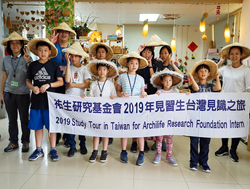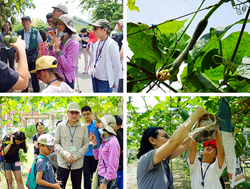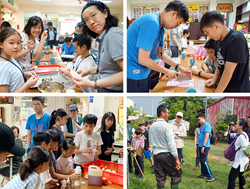
5月份見識之旅活動,於2019年5月25日由呂明澐小姐帶領17位祐生見習生及家長們,進行台南天埔社區絲瓜農事體驗之旅。出發當日天氣晴朗,見習生們及其家長皆準時集合並出發。活動開始之初,領隊呂明澐小姐提醒本次活動注意事項及重點,先行建立見習生的背景知識。
For the study tour of May 25, 2019, Ms. Lu Ming-yun led 17 ARF interns and their parents on a tour of Tianpu Community in Tainan to experience luffa gourd planting. It was clear and sunny on the day of the tour, and the interns and their parents were on time for the departure. At the start of the day's activities, team leader Ms. Lu Ming-yun reminded everyone about things to note and what to observe, and provided the interns some general background knowledge.

上午行程前往台南玉井天埔社區,由社區志工擔任導覽人員。行程一開始,導覽人員介紹絲瓜園四周環境與生態池功能,隨即說明絲瓜生長過程及如何辨別公花和母花,通常公花向陽朝上,母花則朝下且帶有絲瓜狀的長形子房。接著教導眾人辨識絲瓜何時成熟可採摘,若過採收期,內部果肉將逐漸纖維化成絲瓜絡。種植絲瓜時,瓜實蠅為主要害蟲,其會於母花凋謝後產卵在果皮下,孵化後便於果實內取食,為預防蟲害,瓜農通常會在幼果期以報紙套袋,並以黃色黏紙或空寶特瓶塗上黃色黏膠懸掛於園區來捕捉。隨後進行絲瓜套袋體驗,見習生須先找出尚未被瓜實蠅產卵之幼果,再以回收報紙及鐵線絲進行套袋作業。體驗結束後,導覽人員解說絲瓜水的功效及取絲瓜水的方式,絲瓜全數採收完畢後,不再灌溉且取水前七日未下雨的情況下,於傍晚時分切斷接近根部的莖,以大寶特瓶接取流下的汁液,並在隔日清晨取回避免日曬,後經多次過濾即為日常使用之絲瓜水。
The morning's itinerary brought the group to Tianpu community in Yujing, Tainan, where the community's volunteer acted as tour guide. The tour began with an introduction to the environment surrounding the luffa farm and functions of its eco-pond. The tour guide then explained the growing process of the luffa gourds and how to differentiate between male and female flowers. Normally, male flowers will face the sun while the female flowers face downward and carry a small green luffa. Everyone was taught how to determine when the luffa gourds are ready for harvesting as the flesh inside the luffa gourds will become fibrous if left past the harvesting period. When growing luffa gourds, melon flies (Bactrocera cucurbitae) are the main pest. They will lay eggs under the fruit skin after the female flower has withered and the maggots that hatched will start eating from within the fruits. For pest control, luffa farmers will usually cover very young fruits with newspapers, and hang yellow sticky paper or PET bottles smeared with yellow adhesive to capture the flies. The interns were told to find young fruits that had not been infested by fly eggs, and bag them with recycled newspapers and steel wire ties. After the experience, the tour guide explained the effects of luffa water and the method of extracting luffa water. After all the luffa gourds have been harvested, and the plant is no longer watered and there is no rain seven days prior to the water extraction, the stem nearest the root is cut off in the evening and a large PET bottle is used to collect the liquid that flows out. Early next morning, the PET bottle is retrieved and the liquid is filtered several times to obtain the luffa water for daily use.

午飯後,進行絲瓜皂DIY活動,學習手工皂製做方法。離開天埔社區後,前往主要種植愛文芒果的小崇果園,由果園主人李裕崇先生進行導覽。李先生首先講述愛文芒果原產地為美國佛羅里達州,而土芒果則是在荷治時期從印度引進。隨後說明芒果屬漆樹科植物,蜜蜂不喜其味,故以麗蠅(又稱綠頭蒼蠅)授粉為主,其亦受東方果實蠅侵害,遂外銷至日韓等東方果實蠅未入侵之國家時,芒果果實須經檢疫,並以46.5度的蒸氣加熱處理將蟲卵殺死再出口。最後果園主人提及農作物易受天氣影響,今年因雨水多而容易裂果;另外,他處之荔枝園受去年暖冬影響,荔枝開花量異常少,預估今年收成不佳。氣候異變對人類造成之影響,已是刻不容緩的議題,值得眾人深思。至此,本日活動已近尾聲,大家一起合照留念後搭車返程,並期待於下次見識之旅再相見。
After lunch, everyone learned to make luffa soap. The next destination after Tianpu community is Xiaochong Orchard, which specializes in the cultivation of Irwin mangoes. Orchard owner Li Yu-chung was the tour guide. Mr. Li began by explaining that Irwin mangoes were originally grown in Florida whereas the local mango was introduced into Taiwan from India during the time of Dutch rule. Belonging to the Anacardiaceae family, mangoes are not favored by bees and are mainly pollinated by blow flies (Calliphoridae). As mangoes are susceptible to oriental fruit flies (Bactrocera dorsalis), they must pass quarantine inspection, and steamed at 46.5 degrees Celsius to kill any insect larva, when exported to countries that have not been invaded by oriental fruit flies. Finally, Mr. Li said that the crops are easily influenced by weather and the fruits are prone to splitting this year because of the rainy weather. He added that lychee orchards in other places are also affected by the warm winter last year. Due to the unusually small quantity of blossoms, lychee harvest is not expected to be good this year. The impact of climate change on humanity is a pressing issue that deserves serious consideration. At this point, the day's itinerary came to an end. Everyone took a group photo before heading back and looked forward to the next study tour.